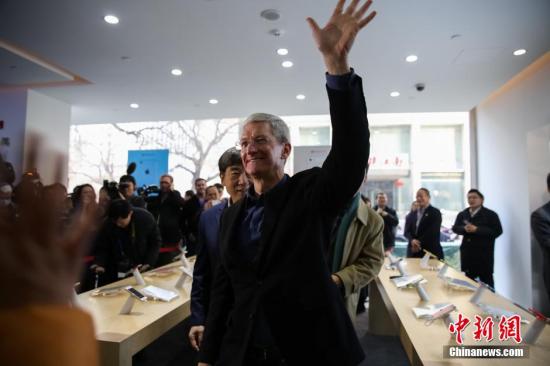

 |
| Cook visits an Apple store in China. (Photo/CNS) |
Indians like to call their country “Incredible India.” Now, another tagline, “Made in India,” is set to become an important label for this country after business magnates Terry Gou and Tim Cook showed interest in moving their production plants to India.
Last week, Cook, who is the CEO of Apple, mentioned that he is considering moving the iPhone production line to India when he met with Indian Prime Minister Narendra Modi. Just a few days earlier, Cook attended an Apple Store developer forum in China and spent some time climbing the Great Wall. But for his visit to India, Cook clearly wished to focus more on business.
Compared to Apple, Gou’s Foxconn, the world's largest contract electronics manufacturer, seems to be engaging even more actively in the Indian market. Last year, Foxconn declared publically that the company supports “Made in India” products. Gou said that Foxconn will start by building plants in five states in India, and then spread out in the next five years. Statistics centers and incubation bases will be established in Deli, Mumbai, Bangalore and Hyderabad. Moreover, Gou promised to invest in Indian Internet companies and mobile phone producers. According to his plan, Foxconn will build at least 10 to 12 plants in India and create 1 million jobs by 2020.
Transferring China’s industrial capacity overseas already seems like an irresistible trend. Chinese mobile producers Gionee, Vivo and ZTE are all currently planning to move their production lines to India.
In the fourth quarter of 2015, India became the biggest economic entity with the fastest growth. China is facing a lot of pressure to compete with India, especially in manufacturing. According to statistics from Boston Consulting Group, the cost of “Made in China” products has now neared the cost of production in the United States. For example, when the cost of an item in the U.S. is $1, it takes 96 cents to produce the exact same item in China.
The report cites an increase in wages, shifting exchange rates and higher energy costs in the past 10 years for China’s manufacturing stress. In India, labor cost is much lower. Just recently, an Indian mobile phone manufacturer promoted a smart phone priced at only 24 yuan.
Professor Palepu Krishna of Harvard thinks it is unnecessary to worry about whether the economic growth rate of India will surpass that of China. However, many manufacturers are clearly betting on the fact that if they move to India now, they can enjoy the benefits of a fast growing economy, just like China did for the past 20 years.
However, a Chinese mobile phone manufacturer notes that, although costs may be lower, there is still no fully developed industrial cluster in India. And considering the many uncertainties in India’s current market, Chinese manufacturing will likely remain competitive for the time being.
 French girl ties the knot with Chinese boy
French girl ties the knot with Chinese boy Beijing Style: ready for bare legs
Beijing Style: ready for bare legs Century-old station sees railyway evolution
Century-old station sees railyway evolution Enthusiasts perform Kung Fu at Wudang Mountain
Enthusiasts perform Kung Fu at Wudang Mountain Stunning photos of China's fighter jets in drill
Stunning photos of China's fighter jets in drill Monk's mummified body to be made into a gold Buddha statue
Monk's mummified body to be made into a gold Buddha statue Former Chinese solider of the French Foreign Legion seeks wife online
Former Chinese solider of the French Foreign Legion seeks wife online Asia's longest and highest suspension bridge to open to traffic
Asia's longest and highest suspension bridge to open to traffic China's first interactive robot looks like a beauty
China's first interactive robot looks like a beauty Top 20 hottest women in the world in 2014
Top 20 hottest women in the world in 2014 Top 10 hardest languages to learn
Top 10 hardest languages to learn 10 Chinese female stars with most beautiful faces
10 Chinese female stars with most beautiful faces China’s Top 10 Unique Bridges, Highways and Roads
China’s Top 10 Unique Bridges, Highways and Roads Tech firms seen leaving Shenzhen
Tech firms seen leaving Shenzhen Diplomats should avoid public opinion spotlight
Diplomats should avoid public opinion spotlight Authorities urged to take action on fake universities that continue to proliferate
Authorities urged to take action on fake universities that continue to proliferate Refugees from Vietnam and their offspring grapple with lack of citizenship after more than three decades
Refugees from Vietnam and their offspring grapple with lack of citizenship after more than three decadesDay|Week